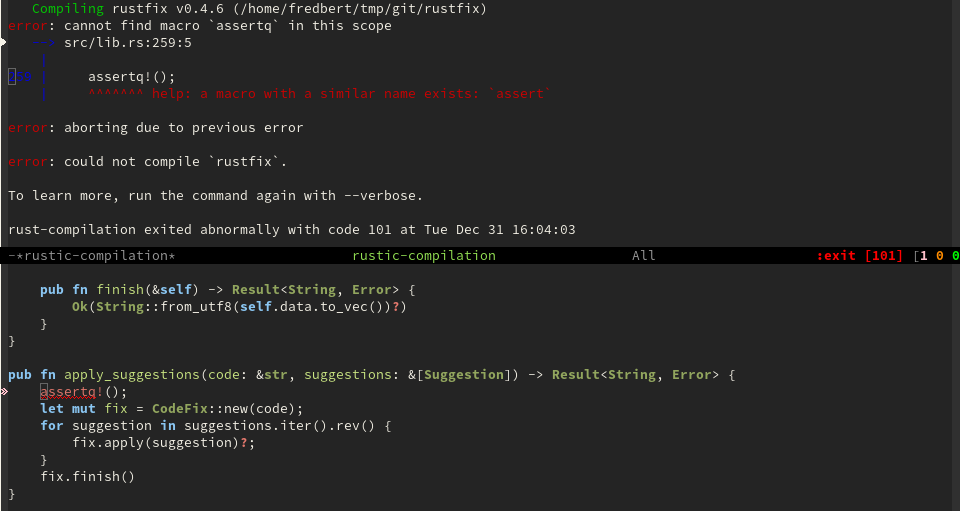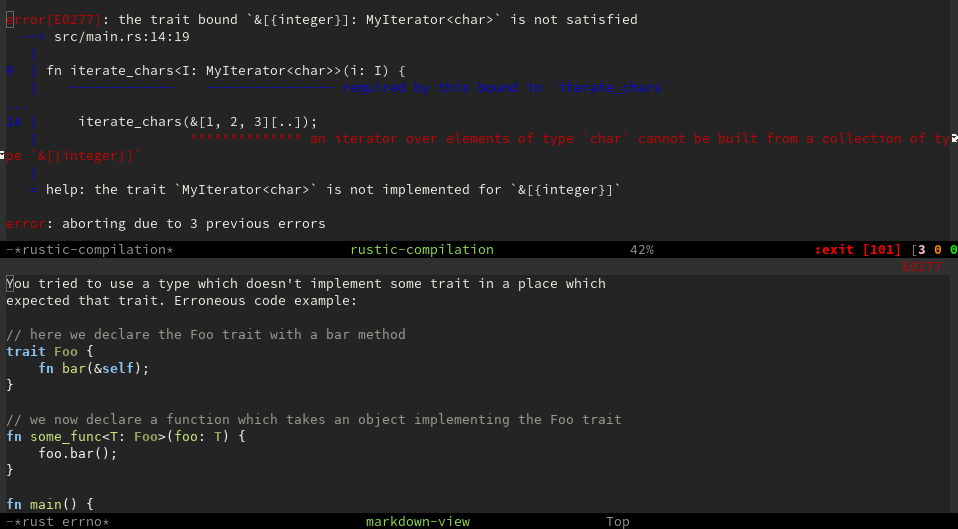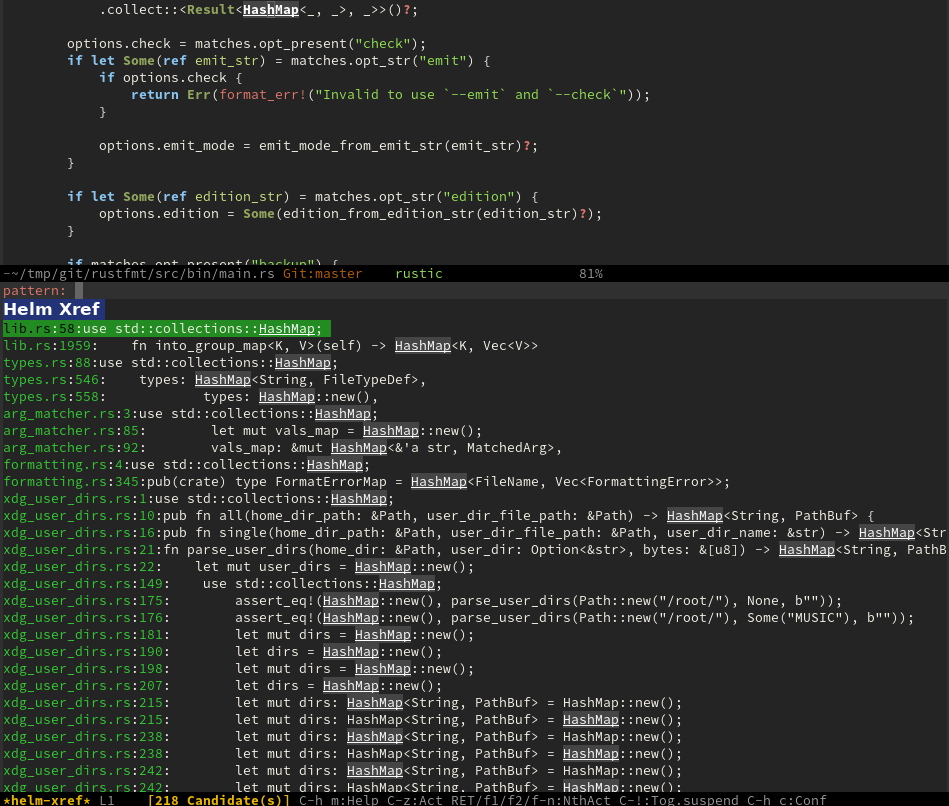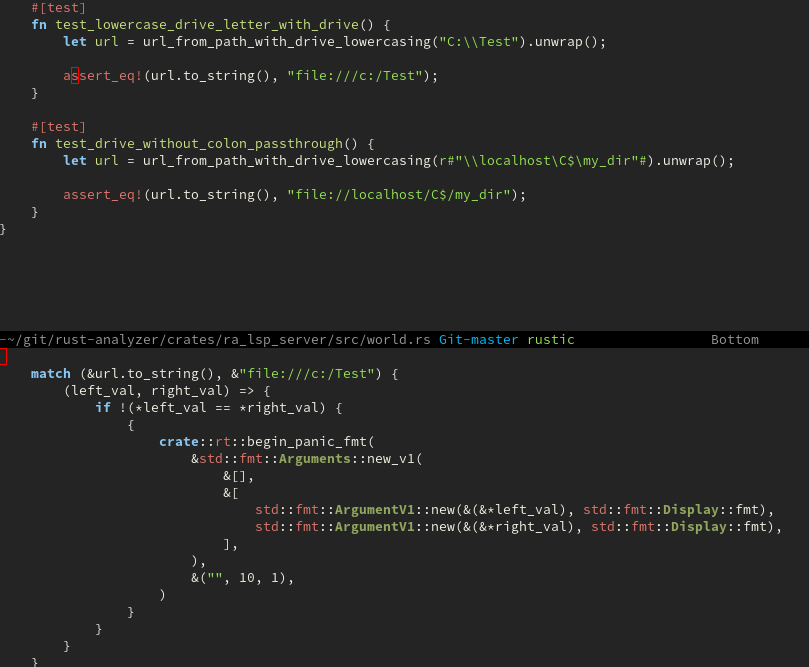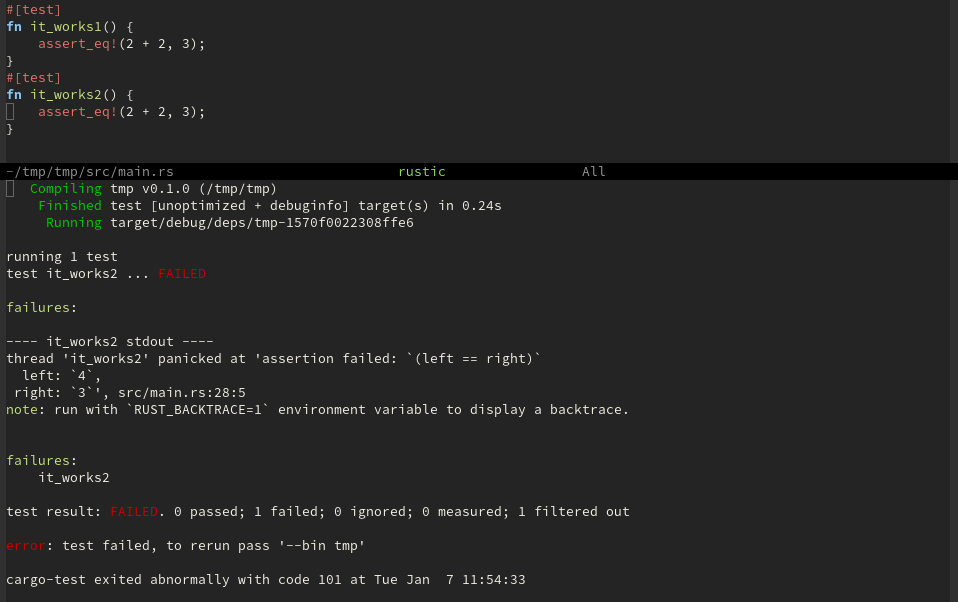This package is a fork of rust-mode
Differences with rust-mode:
- flycheck integration
- cargo popup
- multiline error parsing
- translation of ANSI control sequences through xterm-color
- async org babel
- custom compilation process
- rustfmt errors in a rust compilation mode
- automatic LSP configuration with eglot or lsp-mode
- cask for testing
- requires emacs 26
- etc.
Why fork ?
Simply put (use-package rustic) in your config and most stuff gets
configured automatically.
(use-package)
It's necessary to include elpa for a package dependency:
(setq package-archives '(("melpa" . "http://melpa.org/packages/")
("gnu" . "http://elpa.gnu.org/packages/")))If ‘spinner-1.7.3’ is unavailable” when trying to install rustic, you need to update GPG keys used by the ELPA package manager. Try installing gnu-elpa-keyring-update.
If you have rust-mode installed, ensure it is required before rustic
since it has to be removed from auto-mode-alist. However you only
need rust-mode if you want to use emacs-racer. There's some stuff
that isn't included in rustic.
If you have any issues with rustic, please try running emacs without
rust-mode loaded.
If you can't run rust-analyzer or cargo can't be found, your environment variables probably don't work in emacs. Try exec-path-from-shell to fix this.
straight.el clones each of your packages directly from its source. There are good additional installation instructions for moving your package management from package.el to straight.
Rustic defines a derived compilation-mode. Colors can be customized
with several defcustoms. You can use next-error and
compilation-next-error as for any other compilation buffer.
However it's possible to also jump to line numbers that are displayed
at the beginning of a line. This feature is provided by a hook around
compile-goto-error(RET).
Customization:
rustic-compile-display-methodchoose function that displays the compilation bufferrustic-compile-backtracechange backtrace verbosityrustic-compile-commanddefault command for rust compilation
Supported compile.el variables:
- compilation-arguments
- compilation-scroll-output (not
first-error)
You can format your code with rustic-format-buffer or
rustic-cargo-fmt. Rustic uses the function
rustic-save-some-buffers for saving buffers before compilation. To
save buffers automatically, you can change the value of
buffer-save-without-query. In case you prefer using lsp for
formatting, turn off rustic-format-on-save and set
rustic-lsp-formatto t.
Rust edition 2018 requires a rustfmt.toml file.
Customization:
rustic-rustfmt-binpath to rustfmt executablerustic-format-display-methoddefault function used for displaying rustfmt buffer (use the functionignore, if you don't want the buffer to be displayed)rustic-format-trigger'on-saveformat buffer before saving'on-compilerun 'cargo fmt' before compilationnildon't format automatically
Disable LSP support by setting rustic-lsp-client to nil. You have to
restart emacs when you switch lsp clients.
RLS is the default and can be changed to rust-analyzer. lsp-mode
related code was moved to the lsp-mode repo. rustic-lsp-server sets
the value of lsp-rust-server.
(setq rustic-lsp-server 'rust-analyzer)Change rust-analyzer path.
(setq lsp-rust-analyzer-server-command '("~/.cargo/bin/rust-analyzer"))The default package is lsp-mode. But you can also use eglot.
(setq rustic-lsp-client 'eglot)LSP commands:
xref-find-definitions
xref-find-references with helm and rust-analyzer
Turn off flymake.
(add-hook 'eglot--managed-mode-hook (lambda () (flymake-mode -1)))lsp-describe-thing-at-pointdisplay documentationlsp-find-definitionmakes use of xref
You can find more information in the lsp-mode wiki.
This command can be extremely convenient when applying code actions or using auto-imports.
Run lsp-execute-code-action when lsp-ui displays code actions at the
top of the sideline.
lsp-rust-analyzer-expand-macro expand macro call at point
recursively
The results are formatted and highlighted by default, but you can use
your own function by customizing
lsp-rust-analyzer-macro-expansion-method.
rustic-cargo-test run 'cargo test', when called with C-u store
arguments in rustic-test-arguments
rustic-cargo-test-rerun rerun 'cargo test' with arguments stored in
rustic-test-arguments
rustic-cargo-current-test run test at point
Use rustic-cargo-outdated to get a list of dependencies that are out
of date. The results are displayed in tabulated-list-mode and you
can use most commands you know from the emacs package menu. This
option requires the rust package cargo-outdated to be installed
before being used.
umark single crate for upgradeUmark all upgradable cratesmremove markxperform marked package menu actionsrrefresh crate listqquit window
Currently cargo does not display the correct installation command for
some toolchains when clippy isn't installed. If you have problems try
it with rustup component add --toolchain nightly clippy.
Use rustic-cargo-clippy to view the results in a derived compilation
mode.
If you are running lsp-mode, you can view errors through your lsp
client with lsp-ui-flycheck-list.
In case you want to see clippy lints with flycheck, you can activate
this checker and use the command flycheck-list-errors
(push 'rustic-clippy flycheck-checkers)Turn off flycheck.
(remove-hook 'rustic-mode-hook 'flycheck-mode)Blocks run asynchronously and a running babel process is indicated by a spinner in the mode-line. It's possible to use crates in babel blocks.
Execute babel block with org-babel-execute-src-block
#+BEGIN_SRC rustic :crates '((regex . 0.2))
extern crate regex;
use regex::Regex;
fn main() {
let re = Regex::new(r"^\d{4}-\d{2}-\d{2}$").unwrap();
assert!(re.is_match("2014-01-01"));
}
#+END_SRC
Supported org babel parameters:
Write to file :results file :file ~/babel-output
Customization:
rustic-babel-format-src-blockformat block after successful buildrustic-babel-display-compilation-bufferdisplay compilation buffer of babel processrustic-display-spinnerturn off spinner in the mode-line
You can execute commands with rustic-popup. The list of commands can
be customized with rustic-popup-commands. It's also possible to view
the command's flags with h. The command
rustic-popup-default-action (RET or TAB) allows you to change:
RUST_BACKTRACEenvironment variablecompilation-argumentsforrecompile- arguments for
cargo test
To run the tests, you will need Cask.
make testPRs, feature requests and bug reports are very welcome.
